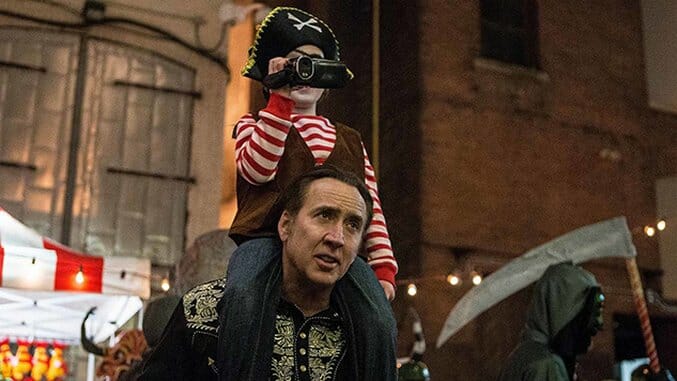Pay the Ghost

Witness: 51-year-old Nicolas Cage running. Now miles away from his Con Air and Face/Off days, during which the world puzzlingly accepted him as a weirdly-mulleted and/or bug-eyed, slurry action star, he’s still running—first in panic, then after a bus, then after his character’s estranged wife, then from a witch-monster ghost-lady thing. In Pay the Ghost, the actor’s latest evidence he’s probably having some serious tax or alimony problems, Nicolas Cage does a lot of running, and the experience of watching Nicolas Cage run feels like we’re in the midst of a nightmare from which we’re unable to wake: We silently and helplessly beg him to push himself harder, to pick up his knees higher, to move his arms more—to go faster. When Nicolas Cage runs, it’s as if he’s treading through a swamp of molasses. Everything is in slow motion. He looks as if he’s in pain. He looks like he’s crying.
How did we get here? The saddest part about Pay the Ghost is that its mediocrity—a B-grade horror with pointless jump scares but a seriously batshit third act worth waiting for—is almost a given for the Oscar-winning actor. His recent films tend to fall more in line with the deplorable likes of Left Behind or Rage (the latter a numb-nuts piece of near-intolerable schlock shared with Danny Glover, who knows well the degrees to which stardom can wane) than the quiet character studies of David Gordon Green’s Joe. But it’s roles like Joe’s which are exactly the kind of stuff that won Cage his big award 20 years ago. Which isn’t to say that we can’t embrace the new version 2.0 Cage, the man we now accept as the primogeniture of straight-to-VOD, balls-out weirdness. Epitomized in Werner Herzog’s brilliant Bad Lieutenant: Port of Call: New Orleans, Nicolas Cage is today a man on the edge of sanity, farting around on the fringes of Hollywood by spiking his considerable chops with total shamelessness.
So the most salient disappointment in Pay the Ghost is that it hardly gives Cage any room to mean-mug, to wildly gesticulate, to do much of anything even vaguely interesting. This is mostly director Uli Edel’s fault as far as being a guy who directs films goes—especially given that Edel knows what it’s like to dip his toes into the Oscar pool before drowning in diminishing returns—because all he can offer Cage is a sort of yawning 90-minute distraction that represents not so much a major disappointment as an assured trajectory for an ever-dwindling career. Setting his style to “bleak” and resorting to, at best, cobbling a visual language from some of Cage’s more compelling features, Edel doesn’t really even seem to know what kind of flick he’s making, sort of wandering aimlessly between supernatural thriller, dark fantasy, mid-’90s bargain-bin horror, and folksy character study. Think The Wicker Man meets—I dunno, let me just close my eyes and randomly point at something in his filmography—um, Bangkok Dangerous? Ugh.
Pay the Ghost introduces us to Professor Mike (Cage), an expert in spooky classical texts at some stock New York collegiate institution, a man who in his quest to gain tenure often forgets to charge his phone, causing him to lose track of time, which often means he’s working late to the detriment of his relationship with his wife Kristen (Sarah Wayne Callies) and son Charlie (Jack Fulton). One would think that Mike’s academic propensity for H.P. Lovecraft and Edgar Allen Poe (demonstrated by an early scene in which Mike’s lecture is actually applauded by his students, some of whom are leered at by the camera, suggesting a teacher-student affair that never happens—only stressing the laziness and stupidity of Edel’s mise-en-scene) would help him with the ensuing ghost story. But no—the fact that he’s a literature professor with his mind steeped in the macabre is never mentioned again, except for lending him an open-mindedness ready to grasp the scary depths of spiritual horror up until then overlooked by the erstwhile oblivious denizens of New York City.
-

-

-

-

-

-

-

-

-

-

-

-

-

-

-

-

-

-

-

-

-

-

-

-

-

-

-

-

-

-

-

-

-

-

-

-

-

-

-

-








































